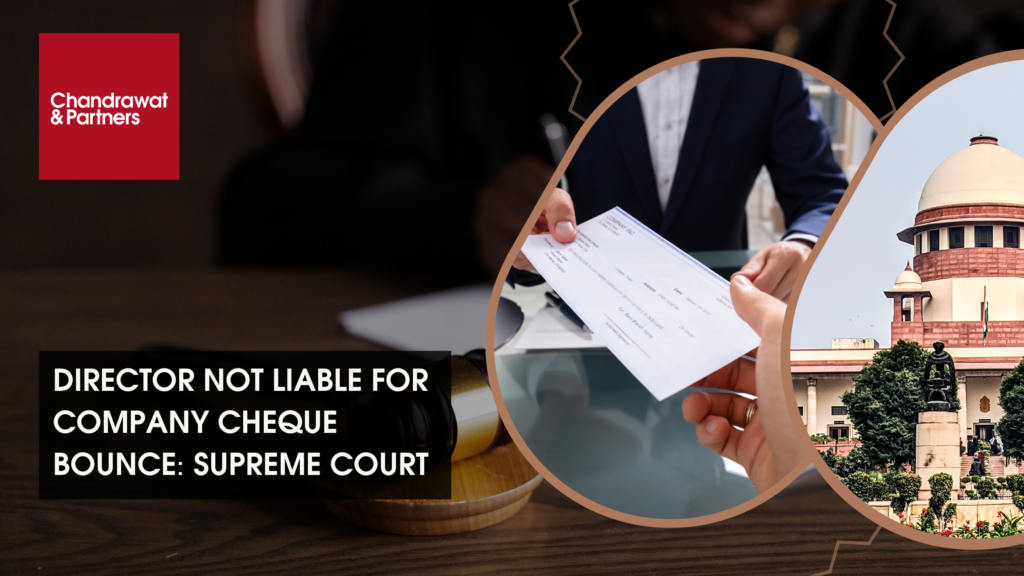Home > Recent Judgements > Director Not Liable For Company Cheque Bounce: Supreme Court
DEC 30, 2024
BACKGROUND
In the case of Bijoy kumar Moni v. Paresh Manna & Anr. in February 2006, the complainant, lent Rs. 7,00,000 through a bearer cheque and subsequently Rs. 1,45,000 in cash to the accused. In repayment, the accused issued a cheque for Rs. 8,45,000 drawn on the account of Shilabati Hospital Pvt. Ltd., where he was a director. This cheque, signed by him as Director, was dishonored due to insufficient funds. The complainant issued a statutory notice under Section 138 (Cheque Bounce) of the Negotiable Instruments (“NI”) Act to the accused.
The Trial Court vide Judgment and Order dated 19.07.2017 held the accused guilty of the offense punishable under Section 138 of the NI Act sentencing him to one year of imprisonment and imposing a fine of Rs. 10,00,000. The Sessions Court upheld the conviction, but the Calcutta High Court acquitted accused observing that as the cheque was drawn by the accused for and on behalf of the company in his capacity as one of the Directors, he could have been held vicariously liable for the alleged offence in terms of Section 141 of the NI Act, but only if the company was made an accused and held guilty.
The complainant appealed before the Supreme Court, arguing that the debt was personal, and the company was not involved in the transaction.
KEY ISSUES
- Whether an authorized signatory of a company be held liable under Section 138 of the NI Act if the company is not made an accused?
- Whether signing a cheque as a director on behalf of a company result in personal liability for its dishonor?
- Whether the interpretation of “drawer” and “account maintained by him” under Section 138?
- Whether vicarious liability function under Section 141 of the NI Act?
JUDGEMENT OF THE CASE
The Supreme Court clarified that under Section 138 of the NI Act, liability for a dishonored cheque applies only to the account holder who maintains the account from which the cheque was drawn. It emphasized that imposing liability on someone who signs a cheque from an account not maintained by them violates the language of the statute. In this case, the cheque was issued from Shilabati Hospital Pvt. Ltd.’s account, not the accused’s personal account. As an authorized signatory, accused could not be considered the “drawer” of the cheque, and therefore, liability under Section 138 did not apply.
The Court also highlighted that for vicarious liability under Section 141, the company, as the principal offender, must be prosecuted first, since the hospital was not arraigned as an accused, the proceedings against accused were invalid. The judgment reinforced the principle of separate corporate personality, stating that an authorized signatory acts on behalf of the company, which remains the primary party liable. The Court dismissed the appeal, noting that civil remedies for the complainant were time-barred, but allowed the possibility of filing criminal proceedings for fraud or cheating under the Indian Penal Code.
OBSERVATION
In this case, the accused was prosecuted in his individual capacity for issuing a dishonored cheque drawn on an account maintained by Shilabati Hospital Pvt. Ltd., where he was a director. The Supreme Court held that under Section 138 of the NI Act, criminal liability arises only if the cheque is drawn on an account maintained by the accused. Since the cheque was drawn on the hospital’s account and the hospital were not arraigned as an accused, no offense under Section 138 could be established. However, the Court noted the accused’s conduct, including the lack of response to statutory notices and failure to address key defenses during trial, indicating possible dishonest intent.
For more information or queries, please email us at
enquiries@chandrawatpartners.com





